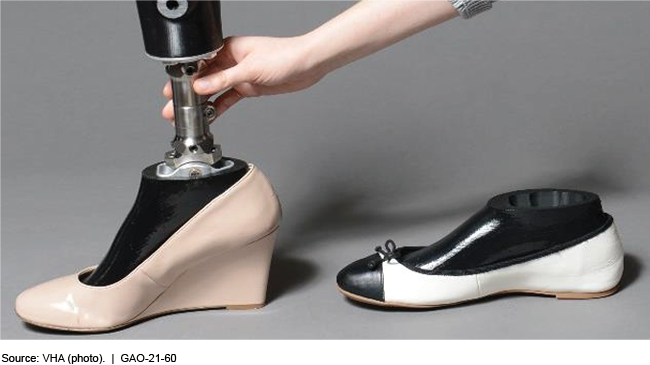Veterans Health Care: Information on Agency Efforts to Provide and Study Prosthetics for Female Veterans
Fast Facts
Women amputees, in particular, have unique needs when they seek prosthetics. For example, there may be fewer commercially available prosthetic devices available for women. Women are also studied less than their male counterparts in prosthetic and amputee rehabilitation research.
Prosthetic care is an important part of veterans health care. This statement for the Congressional Record discusses the prosthetic services the Veterans Health Administration provided to a small but growing female veteran amputee population. It also discusses the studies VHA funded after designating prosthetics for female veterans a national research priority in 2017.
A Prosthetic Developed for Women’s Shoes of Different Heights

Highlights
What GAO Found
The Department of Veterans Affairs' Veterans Health Administration (VHA) provides veterans with prosthetic services to assist with their mobility, vision, and hearing needs. Veterans seeking prosthetics due to amputation have complex needs and are significant users of health care services. VHA provided prosthetic services to a small but growing female veteran amputee population (almost 3 percent of veteran amputees in fiscal year 2019), who were generally younger than male veteran amputees.
VHA has established an individualized patient care approach in its Amputation System of Care that seeks to address the prosthetic needs of each veteran, including accounting for gender-specific factors. VHA officials said that using a standardized, multidisciplinary approach across VHA medical facilities also helps them incorporate the concerns and preferences of female veterans. For example, veterans are provided care by a team that includes a physician, therapist, prosthetist (clinician who helps evaluate prosthetic needs and then designs, fabricates, fits, and adjusts artificial limbs), and other providers as needed. Female veteran amputees GAO spoke with at one VHA medical facility said they were satisfied with their VHA care. However, they also noted a lack of commercially available prosthetic options that VHA providers can use to meet women's needs.
Women are generally studied less than their male counterparts in prosthetic and amputee rehabilitation research. VHA designated prosthetics for female veterans a national research priority in 2017. VHA had funded eight related studies as of May 2020: four pertained to lower limb amputation, three pertained to upper limb amputation, and one pertained to wheelchairs. VHA officials noted the ongoing challenge of recruiting study participants due to the small female veteran population. VHA researchers said they employ various tactics to address this challenge, such as using multi-site studies and recruiting participants from the non-veteran population.
Why GAO Did This Study
Women are the fastest growing veteran subpopulation, with the number of female veterans using VHA health care services increasing 29 percent from 2014 to 2019. Female veterans accounted for an estimated 10 percent of the total veteran population in fiscal year 2019.
This statement for the record provides information from GAO's November 2020 report that examined, among other objectives, (1) characteristics of the female veteran population with limb loss and how VHA provides prosthetic services to these veterans; and (2) VHA's research efforts and the challenges that exist in studying prosthetics for female veterans with limb loss.
For the November 2020 report, GAO analyzed VHA documents, as well as data from fiscal years 2015 to 2019 on prosthetics and veterans with amputations. GAO interviewed agency officials from VHA central office and officials and female veteran amputees at two VHA medical facilities selected for expertise in amputation care and prosthetics research activities. In addition, GAO interviewed VHA researchers conducting studies on prosthetics for female veterans.
For more information, contact Jessica Farb at (202) 512-7114 or farbj@gao.gov.
